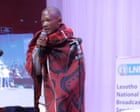
In the fast-paced world of international affairs, significant developments continue to shape the global landscape. From Africa to Asia and beyond, the past few days have witnessed a range of events that have captured the attention of many. This article seeks to calmly and clearly provide an overview of these diverse stories, bringing clarity to the unfolding narratives.
In the Kingdom of Lesotho, a young activist, Tšolo Thakeli, found himself at odds with the government following a video he posted highlighting the persistent issue of unemployment. Known for his advocacy on youth joblessness, Thakeli’s intentions were focused on bringing attention to economic challenges facing the nation’s youth. Yet, the reaction was swift, resulting in his arrest when the content seemed to challenge the leadership’s promises on job creation. Thakeli’s experience underscores the complex engagement between governance and grassroots activism, where expressions of concern can sometimes intersect with political sensitivities.
Meanwhile, in Australia, legal systems addressed matters of digital speech. The federal court directed Sydney-based Muslim cleric Wissam Haddad to remove specific online lectures deemed as containing racist and antisemitic content. While the court acknowledged the legality of criticisms directed at state policies, it reinforced the boundaries of speech in relation to racial discrimination. Such rulings reflect ongoing efforts to balance freedom of expression with societal standards against discrimination. This case resonates with wider discussions on the role of social media as a platform for discourse and the responsibilities it entails.
Shifting focus to the Middle East, concerns over the conditions of political prisoners in Iran have been heightened following recent geopolitical tensions. Reports from families indicate dire situations within the country’s prison systems, exacerbated by recent conflicts involving Israel. The plight of individuals like Reza Khandan points to deeper humanitarian issues within prison systems globally, particularly as geopolitical tensions add layers of complexity to human rights considerations.
These stories, spanning multiple continents, remind us of the diverse challenges and conversations that nations face. Yet, amidst these challenges, there are also signals of unity and shared purpose. In the southern African nation of Mozambique, there is a positive development as the country assumes the presidency of the Community of Portuguese Language Countries (CPLP) Parliamentary Assembly. The focus for the presidency will emphasize peace and inclusion, aiming to foster greater unity and dialogue among member states. This transition reflects Mozambique’s commitment to promoting harmony on a regional scale, offering a hopeful perspective amidst the global uncertainties.
In Southeast Asia, another form of legal scrutiny emerges as former Thai Prime Minister Thaksin Shinawatra faces judgment in a case involving allegations against the monarchy. Accused of defaming the royal advisory body over past political turmoil, this case serves as a reminder of the intricate relationship between political narratives and traditional structures. It underscores the importance of dialogue and legal frameworks in navigating the complex history of governance in Thailand.
These global narratives, each unique yet interconnected, illustrate the multifaceted nature of international discourse. They inform us of the ongoing need for measured conversations and collaborative solutions as the world navigates political, social, and economic landscapes. Through reflection and understanding, we can approach these developments with a calm and mindful stance, fostering a sense of global unity and shared purpose.
Source: {link}
